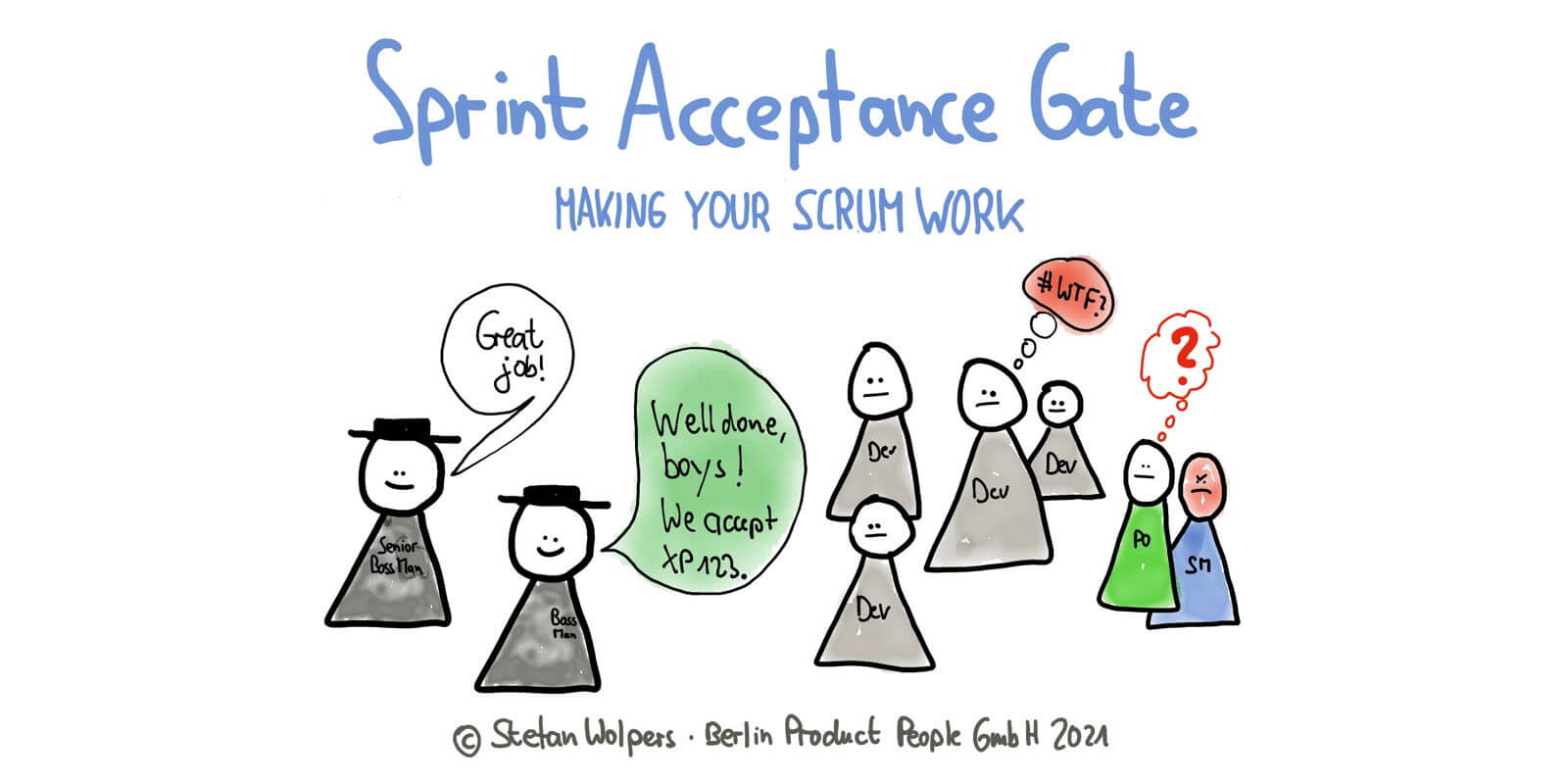TL; DR: The Sprint Acceptance Gate
There are plenty of failure possibilities with Scrum. Given that Scrum is a framework with a reasonable yet short “manual,” this effect should not surprise anyone. Turning the Sprint Review into a Sprint acceptance gate where stakeholders sign off features is unfortunately prominent and defies the idea of self-management.
Join me and explore the reasons and the consequences of this Sprint Review anti-pattern in 80 seconds.


🗞 Shall I notify you about articles like this one? Awesome! You can sign up here for the ‘Food for Agile Thought’ newsletter and join 31,000-plus other subscribers.
🎓 Join Stefan in one of his upcoming Professional Scrum training classes!


Join more than 150 peers from May 27-29, 2021, for the Virtual Agile Camp Berlin 2021, a live virtual Barcamp using open space technology principles and practices.
The Purpose of the Sprint Review According to the Scrum Guide
Unsurprisingly, the Scrum Guide does not mention any form of stakeholder approval being handed down to the Scrum Team at the Sprint Review:
The purpose of the Sprint Review is to inspect the outcome of the Sprint and determine future adaptations. The Scrum Team presents the results of their work to key stakeholders and progress toward the Product Goal is discussed.
During the event, the Scrum Team and stakeholders review what was accomplished in the Sprint and what has changed in their environment. Based on this information, attendees collaborate on what to do next. The Product Backlog may also be adjusted to meet new opportunities. The Sprint Review is a working session and the Scrum Team should avoid limiting it to a presentation.
Source: Scrum Guide 2020.
Why Turning the Sprint Review into a Stakeholder Approval Instance Is a Sign of Cargo Cult Scrum
In my experience, the Sprint acceptance gate anti-pattern is typical for organizations that are still rooted in the industrial paradigm, exercising command & control. Some of the reasons for this anti-pattern are:
- A “my budget, my feature” attitude on the stakeholder side. The Scrum Team is seen as an internal agency, delivering requirements issued by the stakeholders.
- The organization probably follows a metered funding approach, for example, providing a budget for the Scrum Team’s development effort only for a short period.
- There is a general lack of trust in a Scrum Team’s ability to manage itself successfully.
- Middle managers might even fear becoming obsolete after a successful agile transformation and try to stay their ground.
Generally, the Sprint acceptance gate is a sign for an agile transformation that is not fully supported by all stakeholders.
Cannot see the form?
Please click here
Sprint Acceptance Gate — Conclusion
Scrum’s Sprint Review is a critical Scrum event. It answers the question of whether the Scrum Team is still on track delivering the best possible value to the customers and the organization. Avoiding the before-mentioned Sprint Review anti-pattern of the Sprint acceptance gate can hence significantly improve a Scrum Team’s ability to deliver value to the customers.
What have you done to gain your stakeholders’ trust in your Scrum Team thus avoiding misusing the Sprint Review as an acceptance event? Please share your tips & tricks with us.
📖 Sprint Acceptance Gate — Related Posts
15 Sprint Review Anti-Patterns Holding Back Scrum Teams
The Hardening Sprint Fallacy — Making Your Scrum Work #2
A Sprint Review without Stakeholders — Making Your Scrum Work #3
Download the Scrum Anti-Patterns Guide for free.
📅 Scrum Training Classes, Workshops, and Events
You can secure your seat for Scrum training classes, workshops, and meetups directly by following the corresponding link in the table below:
See all upcoming classes here.
You can book your seat for the training directly by following the corresponding links to the ticket shop. If the procurement process of your organization requires a different purchasing process, please contact Berlin Product People GmbH directly.
✋ Do Not Miss Out and Learn about Sprint Acceptance Gate Anti-Pattern: Join the 12,000-plus Strong ‘Hands-on Agile’ Slack Team
I invite you to join the “Hands-on Agile” Slack team and enjoy the benefits of a fast-growing, vibrant community of agile practitioners from around the world.
If you like to join now all you have to do now is provide your credentials via this Google form, and I will sign you up. By the way, it’s free.

